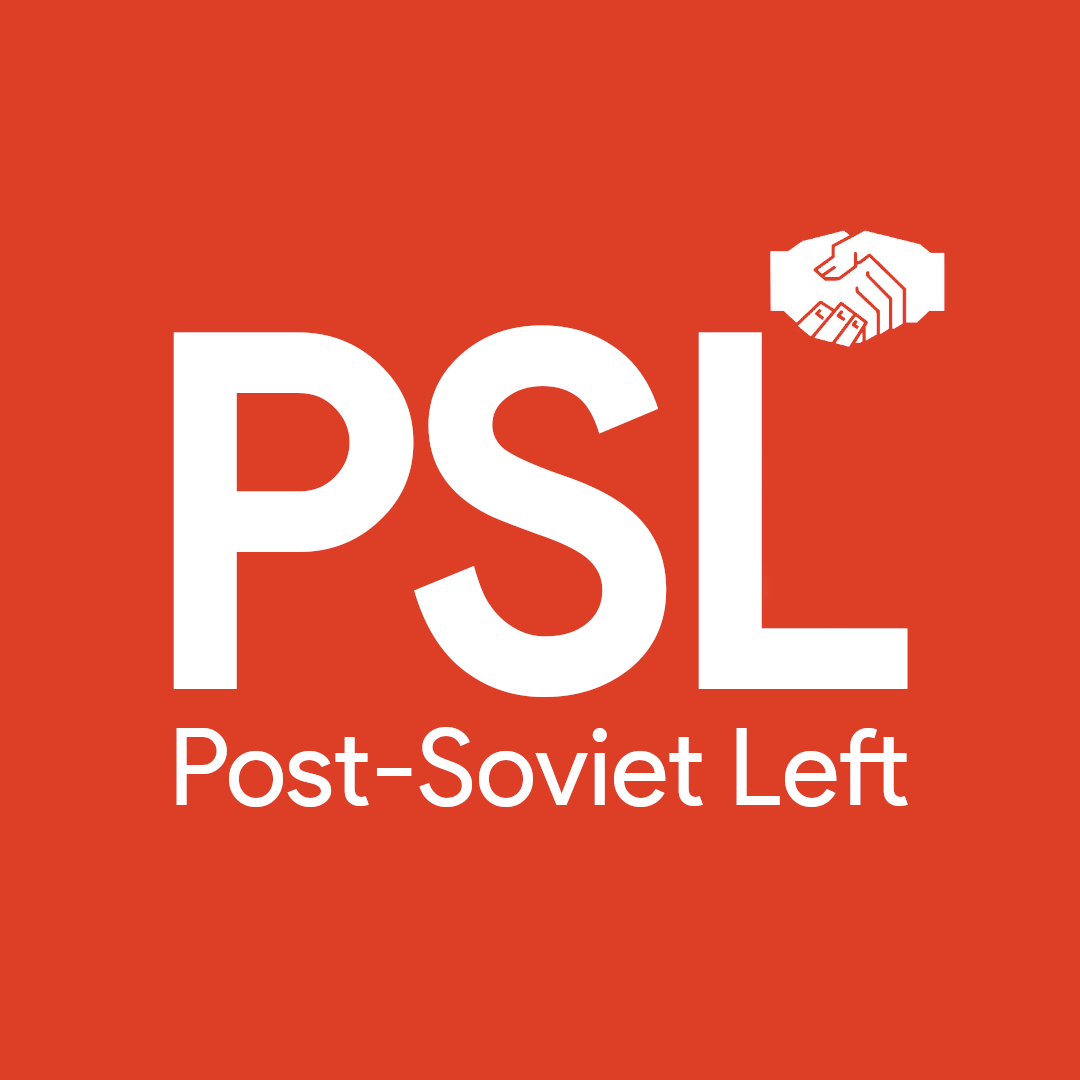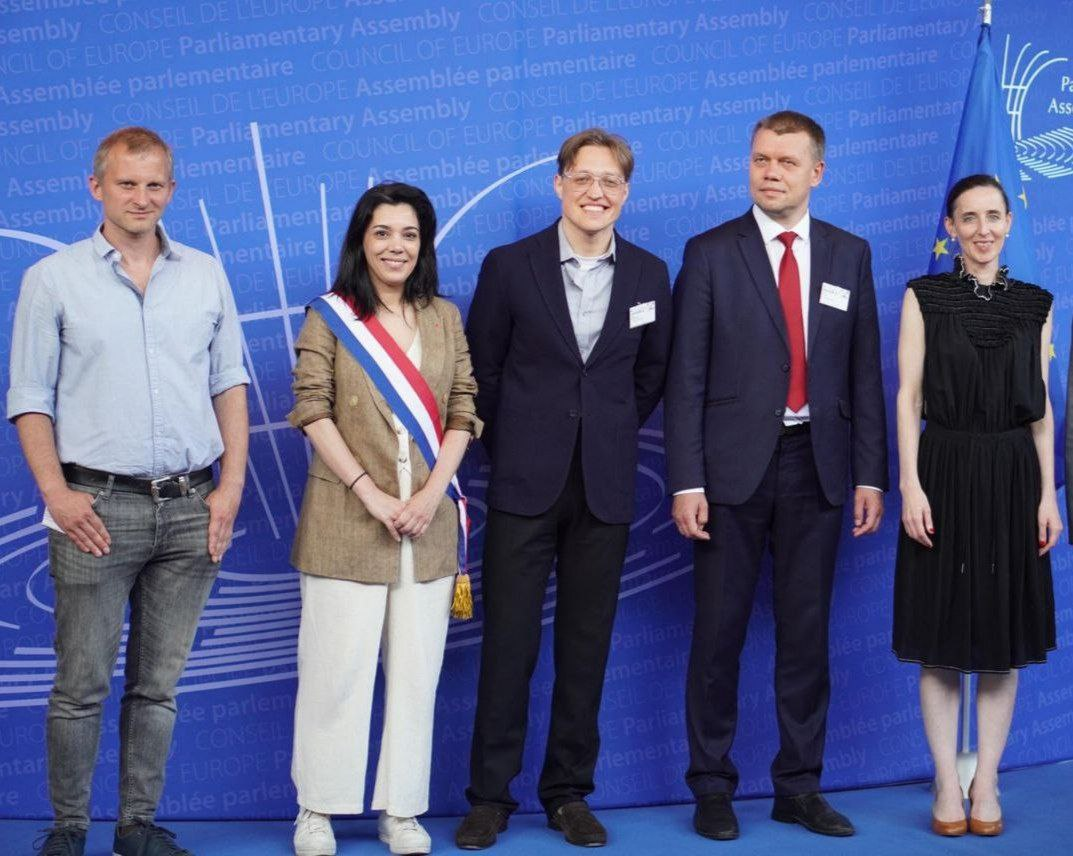On Monday, June 23, a hearing was held within the walls of the European Parliament in Strasbourg. A representative of the PSL, Ukrainian citizen Andrei Konovalov, took part. We asked Andrei to tell us more about the event.
— Briefly, what was the event about? Where was it held, and who organized it?
— The event took place in the Council of Europe building in Strasbourg and included several key meetings: first, with French parliamentarians, and second — with members of The Left group in PACE, which brings together left-wing representatives from various European parliaments. The reason for the invitation was a draft resolution on the war in Ukraine, which raised concerns within the left faction due to its one-sided nature.
Although the resolution condemned the aggression of the Russian Federation, it ignored the issue of amnesty for Russian political prisoners and remained silent on the rapidly growing number of politically motivated verdicts within Ukraine itself. These sentences are based on articles that do not meet international standards, including those of the UN Convention. This “blind spot” in the Western human rights discourse was one of the reasons for my participation, following an invitation from deputies of La France Insoumise, especially from Sophia Chikirou, one of the coordinators of the party’s group in the French National Assembly.
The Council of Europe building itself, despite its prestige, left a rather restrained impression — somewhat paradoxically, many modern research institutions are more striking in terms of their technological sophistication and architecture. What truly mattered, however, were the substantive and personal connections. It was an opportunity not only to reconnect with old allies among German and French deputies but also to establish new relationships.
One particularly memorable moment was a private conversation with Martinus “Tiny” Kox, former president of PACE from the Netherlands, who expressed a very clear and well-founded position: that without open criticism of human rights violations and breaches of democratic standards in present-day Ukraine, no genuine improvement is possible — neither within the country nor in the context of the ongoing conflict.
Moreover, he emphasized — and this aligned completely with our own view — that such criticism has nothing to do with pro-Russian narratives, despite the frequent accusations from even left-wing opponents, including among the so-called “good Russians.” On the contrary, well-founded criticism is a manifestation of solidarity with the Ukrainian people — if we take leftist principles seriously.
— What were the goals of the hearing, and were they achieved?
As I mentioned, the main goal of the hearing was to try to revise the draft resolution, to make it more balanced and humane.
My own objective was to bring to the attention of European parliamentarians facts that remain at the margins of public discourse today — despite their critical importance. I’m talking about tens of thousands of criminal proceedings opened in Ukraine under Article 111-1 of the Criminal Code — on “collaboration.” Its vague and broad wording has already been criticized both by the head of the UN Human Rights Monitoring Mission in Ukraine and by the UN Committee Against Torture.
According to the UN’s findings from June 17, 2025, individuals accused under this article have been subjected to torture and other forms of ill-treatment (for example, being held in basements). These findings are official, yet surprisingly little-known.
My task was to make these facts visible to European lawmakers, especially now — when the international agenda is almost entirely dominated by Iran and Israel, pushing Ukraine out of the spotlight. It was important to convey accurate information about the scale of politically motivated persecution in my home country — including statistics on thousands of cases initiated under a law that does not comply with international legal standards or human rights conventions.
Equally important for me was to show that among Ukrainian leftists, there are those who support the efforts of European deputies fighting for the universal application of human rights — including in Ukraine.
Of course, we were not able to secure amendments to the resolution that would directly criticize the Ukrainian government for systematic rights violations and call for political amnesty not only in Russia but also in Ukraine — and that was predictable. Anyone familiar with the internal political architecture of the Assembly knows the role played there by forces aligned with the official position of the Ukrainian state.
Nonetheless, a journey of a thousand miles begins with a single step. We’ve already taken a step toward consolidating the left-wing faction around a basic principle: human rights must be protected everywhere, including in Ukraine. This is an important precedent and a foundation for eventually influencing the broader stance of European institutions.
— What was the focus of your speech?
At both sessions, I focused on specific examples and facts in order to move the discussion beyond abstractions and demonstrate the real scale of the legal catastrophe unfolding in Ukraine today. At the center of my speech was Article 111-1 of the Criminal Code, under which more than 10,000 criminal cases have been opened and over 2,500 convictions have already been issued — often for actions that do not meet the definition of a crime under international law.
I gave the example of Viktoriya Kryukonova, an employee of a pension fund branch in a village that had been under Russian occupation. She worked there for 45 days — after which she managed to move to Ukrainian-controlled territory. For those 45 days, the prosecution is demanding 7 years of imprisonment.
Another example was Tatyana Prokopenko — a resident of an occupied area who distributed humanitarian aid. She did this for her own survival and that of her fellow villagers. For this, she was sentenced to 5 years in prison, more than a year of which she has already served. Her actions do not constitute a crime — neither from the standpoint of common sense nor from that of international humanitarian law.
It was important not only to share such cases but to show the systemic nature of the problem. Over the past two years, more than 10 legislative proposals have been submitted in the Verkhovna Rada (Ukrainian parliament) aimed at revising Article 111-1. Not a single one has even been brought up for discussion by the speaker from the ruling party Servant of the People.
As highlighted in a recent article in one of France’s leading newspapers, Le Monde, representatives of the Ukrainian judicial system privately admit their own inability to guarantee justice — and directly advise defendants to leave the country, citing “society’s unpreparedness to treat them fairly.” This conclusion has also been confirmed by several European judicial bodies — including the French Court of Cassation, Ireland’s High Court, and Austria’s Court of Appeals. All have denied extradition requests for Ukrainian citizens on the grounds that a fair trial cannot be guaranteed in Ukraine’s current legal system.
These facts already exist — they are documented and verified, but sadly, they remain either unknown or deliberately ignored. My speech was dedicated to both of these problems: the informational vacuum and the political unwillingness to acknowledge the obvious. And that is precisely why I considered it necessary to call on European lawmakers to send a clear and unequivocal message of support to all those in Ukraine who are facing unjust persecution and have been deprived of basic access to justice.
— Is it meaningful for post-Soviet leftists to participate in such events?
The importance of participating in such events cannot be overstated. One often encounters the mistaken belief that if our actions do not produce immediate results, then they are meaningless. But that is a dangerous illusion.
In reality, the cornerstone of the current system of repression in Ukraine is silence. Its entire stability depends on the fact that what is happening is either concealed or justified as “inevitable” in times of war. That is why the moment when criticism begins to be voiced not just by individual deputies or activists, but by entire parliamentary groups and committees, will be a turning point. It will mean that the false consensus is beginning to crack — and with it, the legitimacy of unpunished violence.
When we gain the solidarity of leftist parliamentarians, create precedents for public support, and make the topic visible — we strike at the most vulnerable point of this system. It is a long and difficult path, but that is how myths collapse. That is how reality changes.
Even today, we see that our efforts are not going unnoticed. We are supported by influential deputies and politicians from Central Europe — such as the aforementioned Martinus “Tiny” Kox, Sophia Chikirou, former The Left group leader Andrej Hunko, and the newly elected group leader, George Loukaides — all of whom have personally expressed their solidarity with our position, along with many others whose support is both politically and morally significant.

